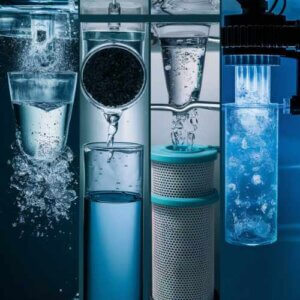When choosing the right water option for your health and home, the choices can be overwhelming. You may have heard of purified and filtered water, but do you know their differences? Are they the same thing, just with different names?
Prepare to have your assumptions challenged as we delve into the world of purified and filtered water. In this article we will explore the important differences between these two types of water and how they can impact your health and home. By the end, you will clearly understand which option best suits your needs.
So, let’s begin our journey of discovery and find out if purified water is the same as filtered water. Are you ready to learn the truth?
Understanding Purified Water
In this section, we will explore purified water and what it means for water to be considered purified. Purified water is a term used to describe water that has been treated to remove impurities and contaminants. This process ensures that the water meets certain quality standards and is safe for consumption.

Various methods are used to achieve purification, including distillation, reverse osmosis, and deionization. Each method targets different impurities and contaminants, ensuring the water is thoroughly clean and safe to drink.
Consuming purified water has numerous health benefits. Firstly, it helps eliminate harmful substances that may be present in tap water, such as chlorine, bacteria, and heavy metals. By removing these contaminants, purified water provides a safer and healthier option for hydration.
Furthermore, purified water can improve the taste and odor of the water, making it more enjoyable to drink. This can encourage increased water intake, improving overall hydration and potential health benefits.
Exploring Filtered Water
Filtered water is a popular choice for those seeking a healthier alternative to tap water. This section will delve into the water filtration process and discuss the different filtration methods available.
Understanding Water Filtration
Water filtration removes impurities and contaminants from tap water, resulting in cleaner, better-tasting water. Filtration systems pass water through filters that trap and remove particles, chemicals, and microbes.

Types of Water Filtration Methods
There are several types of water filtration methods available, each with its advantages and considerations:
- Carbon Filtration: Carbon filters effectively remove contaminants like chlorine, sediment, and volatile organic compounds (VOCs). They are also known for improving taste and odor. Carbon filters can be found in pitcher filters, faucet filters, and under-sink systems.
- Reverse Osmosis (RO): RO systems use a semi-permeable membrane that removes many contaminants, including heavy metals, fluoride, bacteria, and viruses. RO water filters are often combined with carbon filters for comprehensive filtration.
- UV Sterilization: UV filters use ultraviolet light to destroy harmful microorganisms like bacteria and viruses. They are typically used with other filtration methods to protect against waterborne pathogens.
- Ion Exchange: Ion exchange filters effectively reduce water hardness by swapping calcium and magnesium ions for sodium ions. Water softeners are commonly used to prevent limescale buildup on appliances and plumbing.
Advantages and Limitations of Filtered Water
Filtered water offers several benefits over tap water, including improved taste, reduced exposure to contaminants, and the convenience of readily available clean water at home. However, it’s important to note that not all filtration methods are equally effective at removing specific contaminants. Some filtration systems may require regular maintenance and filter replacements to ensure optimal performance.
Now that we understand the process of water filtration and the different types of filtration methods available let’s move on to the next section, where we will directly compare purified water and filtered water to help you make an informed decision.
Key Differences Between Purified and Filtered Water
When choosing the right water option for your health and home, understanding the differences between purified and filtered water is crucial. While both options aim to improve water quality, their methods and outcomes vary.

Purified Water
Purified water undergoes a rigorous process to remove impurities, contaminants, and harmful substances. Purification methods commonly used include distillation, reverse osmosis, and deionization. These processes eliminate various pollutants, such as bacteria, viruses, heavy metals, and chemicals, ensuring the water meets stringent quality standards.
Filtered Water
Purified water undergoes rigorous processes (like reverse osmosis or distillation) to remove basic contaminants, microscopic pollutants, and dissolved solids. This results in a higher purity level, ideal for those with health concerns or compromised immune systems.
Filtered water uses carbon or ceramic filters to improve taste and odor and reduce common impurities like chlorine. It’s a good choice for general water quality improvement.
The choice between the two depends on your needs. Purified water offers exceptional purity but can be more expensive and require more maintenance. Filtered water is more affordable and easier to maintain, balancing cost and quality improvement.
Consider your desired water purity, health needs, budget, and how much maintenance you will do when deciding.
Impact on Health
Regarding your health, the type of water you consume can have a significant impact. Both purified and filtered water offer various health benefits, and understanding these effects can help you choose the right option for your well-being.
Potential Health Benefits of Purified Water
Purified water undergoes a rigorous process to remove contaminants and impurities, producing high-quality, clean drinking water. Purified water can support your overall health and hydration by eliminating harmful substances like chemicals, heavy metals, and pathogens. It provides a refreshing and pure water source, free from potential health hazards.
Health Effects of Filtered Water
Filtered water provides health benefits by removing impurities and improving tap water’s taste and smell. Depending on the filter, it can effectively reduce chlorine, sediment, and other common contaminants. Cleaner, better-tasting water encourages hydration, which is vital for overall health.
Whether you need simple filtration or more extensive purification depends on your concerns. If you’re focused on removing specific contaminants, purification might be the best choice. For general taste and odor improvement, filtration is often sufficient.
Remember, the health effects of both types of water depend on the quality of your tap water and the specific product chosen. A water treatment professional can help you make the best decision for your health.
Both purified and filtered water can make drinking water safer and more enjoyable, supporting a healthier lifestyle. Consider your needs and preferences to make the right choice for you!
Considerations for Your Home
Several factors are key when choosing the right water option for your home. Here’s what you need to consider:
- Installation: Purified water systems often need professional installation for proper setup and safety. Filtered water systems may be DIY-friendly, ranging from faucet filters to simple pitchers.
- Maintenance: Purified water systems, like filter replacements, generally require regular maintenance to ensure ongoing water quality. Filtered water maintenance varies by type. Factor this into your decision.
- Cost: Purified water systems can have higher upfront costs (installation, equipment). Filtered systems are often cheaper upfront but factor in ongoing expenses like filter changes.
- Availability: Depending on your location, one type of system or water supply might be more readily available. Research what’s accessible to you.
Understanding these factors will help you decide what is best for your home’s needs and budget.
When choosing the right water option for your home, consider factors such as installation requirements, maintenance, cost, and availability of purified and filtered water options. By carefully evaluating these considerations, you can make an informed decision that meets your needs and provides the quality water you desire for your home.
Other Types of Water: Distilled Water
In addition to purified and filtered water, distilled water is another option. Distillation involves boiling water and collecting the steam, which is then condensed. This process removes most impurities, including minerals, creating exceptionally pure water.

Distilled water’s purity is ideal for scientific experiments, medical use, and industrial processes. However, since it removes beneficial minerals like calcium and magnesium, it may not be the best choice for daily drinking water.
When choosing, consider your needs. Distilled water is for those requiring the highest purity. Purified or filtered water might be better for everyday drinking where you want to retain minerals.
It’s all about balancing your priorities and understanding the differences between these water types!
Conclusion
Purified and filtered water each have their advantages. Purified water offers exceptional purity by removing a wide range of contaminants. Filtered water is a convenient way to improve water quality while keeping beneficial minerals.
The best choice for you depends on your priorities. If maximum purity is key, purified water might be ideal. If cost, environmental impact, and retaining minerals are important, filtered water could be better.
Remember to consider installation, maintenance, and cost when making your decision. Purified and filtered water can give your household cleaner, safer drinking water.

